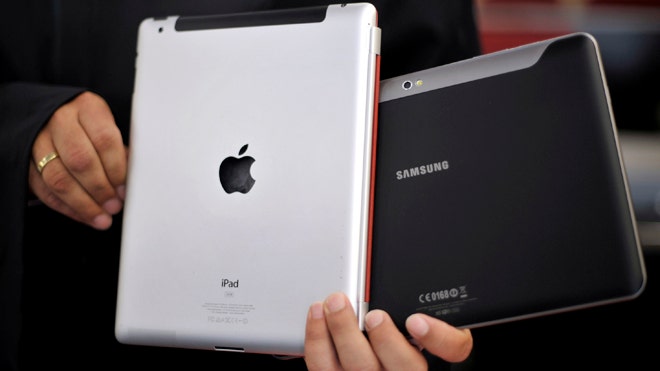SAN FRANCISCO â€"  Opening arguments were expected Tuesday to decide the merits of Apple Inc.'s claims that Samsung Electronics Co.'s smartphones and computer tablets are illegal knockoffs of the iPhone and iPad.
Opening arguments in federal court will be followed by Apple calling its first witness, a company designer. The witness lists of both sides are long on experts, engineers and designers and short on familiar names. Apple CEO Tim Cook, for example, is not scheduled to testify.
Apple filed a lawsuit against the South Korean company last year alleging smartphones and computer tablets made by the world's largest technology company are illegal knockoffs of Apple's popular iPhone and iPad products.
Apple is demanding $2.5 billion in damages, an award that would dwarf the largest patent-related verdict to date.
Samsung countered that Apple is doing the stealing and that some of the technology at issue -- such as the rounded rectangular designs of smartphones and tablets -- has been industry standards for years.
The case is just the latest skirmish between the companies over product designs. A similar trial began last week, and the two companies have been fighting in courts in the United Kingdom and Germany.
U.S. District Judge Lucy Koh last month ordered Samsung to pull its Galaxy 10.1 computer tablet from the U.S. market pending the outcome of the upcoming trial, though she barred Apple attorneys from telling the jurors about the ban.
"That's a pretty strong statement from the judge and shows you what she thinks about some of Apple's claims," said Brian Love, a Santa Clara University law professor and patent expert. He said that even though the case will be decided by 10 jurors, the judge has the authority to overrule their decision if she thinks they got it wrong.
'The big part of the case is not Apple's demands for damages but whether Samsung gets to sell its products.'
- Mark A. Lemley, director of the Stanford Program in Law, Science, and Technology.
"In some sense the big part of the case is not Apple's demands for damages but whether Samsung gets to sell its products," said Mark A. Lemley, a Stanford Law School professor and director of the Stanford Program in Law, Science, and Technology.
Lemley said a verdict in Apple's favor could send a message to consumers that Android-based products such as Samsung's are in legal jeopardy. A verdict in Samsung's favor, especially if it prevails on its demands that Apple pay its asking price to certain transmission technology it controls, could lead to higher-priced Apple products.
Apple lawyers argue there is almost no difference between Samsung's products and Apple's and that Samsung internal documents show it copied Apple's iconic designs and its interface.
Samsung denies the allegation and counter-claims that Apple copied its iconic iPhone from Sony. Samsung lawyers noted the company has been developing mobile phones since 1991 and that Apple jumped into the market in 2007.

No comments:
Post a Comment